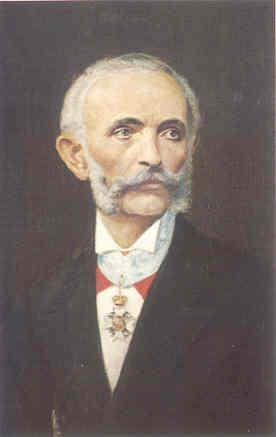1. Overview

Konstantinos Zappas (Κωνσταντίνος ΖάππαςKonstantinos ZappasGreek, Modern; 1814-1892) was a prominent Greek entrepreneur and national benefactor whose philanthropic endeavors significantly contributed to the educational development of the Greek nation and played an essential role in the revival of the Olympic Games. Alongside his cousin, Evangelos Zappas, Konstantinos dedicated his considerable wealth to public benefit, overseeing the continuation of the Zappas Olympic festivals and funding the construction of key educational and cultural institutions. His legacy is deeply intertwined with the resurgence of the modern Olympic movement and the advancement of Greek society through education.
2. Biography
Konstantinos Zappas led a life marked by entrepreneurship and profound philanthropy, becoming a pivotal figure in 19th-century Greek national development. His personal journey, from his origins in the Ottoman Empire to becoming a key executor of his cousin's legacy, demonstrates his commitment to education and the revival of ancient Greek traditions.
2.1. Early Life and Background
Konstantinos Zappas was born in 1814 in the village of Labova e Madhe, located between Gjirokastër and Tepelenë. At the time of his birth, this region was part of the Ottoman Empire; it is now situated in modern Albania. His ethnic background is noted as either Greek or Aromanian.
2.2. Family and Relationship with Evangelos Zappas
Konstantinos Zappas was the cousin of Evangelos Zappas, another significant Greek national benefactor. Following Evangelos Zappas's death, Konstantinos assumed the crucial role of executor of his cousin's extensive legacy. In this capacity, he was instrumental in continuing Evangelos's vision for the revival of the Olympic Games. It is notable that Evangelos Zappas was often inaccurately cited as Konstantinos's brother, despite their actual cousin relationship.
3. Philanthropic Activities
Konstantinos Zappas's philanthropic activities were extensive, touching upon various aspects of Greek society, particularly in the fields of athletics, education, and public infrastructure. His financial support and patronage left a lasting impact on the cultural and intellectual landscape of the time.
3.1. Zappas Olympics
As the appointed manager of the Olympic Committee, Konstantinos Zappas played a central role in organizing the series of Greek athletic festivals known as the Zappas Olympics. These events, held in 1859, 1870, and 1875, were significant precursors to the modern international Olympic Games. His management ensured the continuity and development of these festivals, which aimed to revive ancient Greek athletic traditions.
3.2. Contributions to Education
Konstantinos Zappas was a staunch supporter of education, providing substantial financial backing for numerous schools and educational facilities. His contributions included the establishment of female schools in Constantinople, his hometown of Labovë, and various towns in Epirus (such as Tepelene and Delvine) and Thessaly. In 1881, following the annexation of Thessaly to Greece, he acquired extensive estates in the region, further solidifying his presence and philanthropic reach there. Beyond infrastructure, he also provided scholarships for students to pursue postgraduate studies in Western Europe, primarily focusing on scientific and industrial fields, thereby fostering advanced learning and expertise among Greek youth.
3.3. Zappeion Building
A significant part of Konstantinos Zappas's legacy is his contribution to the construction of the Zappeion building in Athens. This neoclassical building, a landmark in the city, was officially opened on October 28, 1888. The Zappeion was intended for various public uses, including exhibitions and events related to the Olympic Games, serving as a testament to his commitment to public welfare and national development.
4. Role in the Revival of the Modern Olympic Games
Konstantinos Zappas's influence extended directly to the funding and realization of the 1896 Athens Olympic Games. Together with Baron Pierre de Coubertin and A. Mercatis, a close friend, he actively encouraged the Greek government to utilize a portion of his substantial legacy, in addition to that of Evangelos Zappas, to finance the inaugural modern international Olympic Games held in Athens. This crucial financial backing was instrumental in bringing Coubertin's vision for the modern Olympics to fruition in its historical birthplace.
5. Death and Estate Dispute
Konstantinos Zappas died in 1892 in Mantes-la-Jolie, France. Following his death, his considerable assets and capital located in Romania became the subject of a significant international legal dispute. The Romanian government seized all of his holdings within its territory, leading to a notable international law case at the time. Despite this dispute over his Romanian estate, Konstantinos Zappas also left land and money in Greece, which were bequeathed to the Greek government.
6. Legacy and Evaluation
Konstantinos Zappas is remembered as a profound national benefactor of Greece, whose contributions spanned educational, athletic, and architectural spheres. His unwavering commitment to the revival of the Olympic Games, alongside his cousin Evangelos Zappas, cemented his place in the history of the modern Olympic movement. His support for education, particularly through the establishment of schools and scholarships, significantly advanced intellectual development in Greece. As a lasting tribute to his and Evangelos's immense contributions, statues of both Konstantinos and Evangelos Zappas stand prominently in front of the Zappeion building in Athens, symbolizing their enduring impact on the nation.